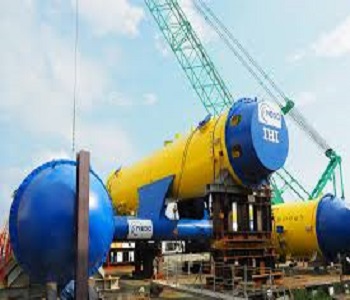Japan turbo generators market is projected to witness a CAGR of 3.15% during the forecast period FY2025-FY2032, growing from USD 1.08 billion in FY2024 to USD 1.38 billion in FY2032. The demand for turbo generators is driven by various factors, such as a combination of decarbonization goals, modernization of power infrastructure, and the shift toward clean energy sources. Turbo generators can generate large amounts of electricity and are essential for large utility-scale power plants. The demand for turbo generators is high in the power sector as equipment assists in maintaining grid stability and ensuring a reliable supply of electricity to industrial, commercial, and residential users.
In Japan, the government is making considerable investments in the transition to green energy. Turbo generators are integral to reducing emissions in fossil fuel-based and renewable energy power plants. High-quality turbo generators help reduce the amount of fuel required for electricity generation, thereby lowering the overall carbon footprint of power generation. Different kinds of turbo generators are used in renewable energy plants, such as hydropower and biomass plants, to produce electricity.
Moreover, turbo generators are used in nuclear plants specifically designed to handle high temperatures and pressures, which make equipment essential for the safe and efficient operation of nuclear reactors. The focus on enhancing the operational efficiency of existing power plants through digitalization and performance optimization is further boosting the turbo generators market size.
For instance, in August 2024, Tokyo Electric Power Co. Holdings decided to invest USD 3.2 billion in the development of the power grid and production capacity over the forecast years to meet the Japanese power demand for data centers. This development will increase the demand for turbo generators in new plants.
High Investment in Large-Scale Power Generation Plants Accelerate Market Growth
Large-scale power generation plants are a critical part of the power sector as plants ensure a stable and continuous power supply to different end-users in the country. As economies grow and industrialization accelerates, the inflow of investment in the power sector to increase production capacity creates a strong demand for turbo generators in the market. Turbo generators are capable of generating large amounts of electricity, which is essential for meeting the rising demand for energy in Japan.
Investments are being made in retrofitting old coal and thermal power plants to adapt supercritical and ultra-supercritical technologies, which require advanced turbo generators capable of operating at higher pressures and temperatures, driving the growth of the turbo generators market. Even the private sector is investing in hybrid systems power plants, such as renewable power plants combined with backup natural gas systems, which foster turbo generator equipment in power plants. Turbo generators are integral to large-scale renewable energy projects, particularly in hydropower and biomass plants. The rise in investment in building large-scale renewable energy plants will drive the growth of the turbo generators market.
Thus, the modernization of older plants and the transition to cleaner energy sources will further increase the demand for high-performance turbo generators, which will create a substantial demand for turbo generators in the global energy market.
In August 2024, the Ozu biomass plant located in Japan started its commercial operation. The plant is a biomass-only thermal power plant using wood pellets as fuel. The plant has a power output of 50,000 kW and an annual power generation of approximately 350 million kWh. This development will increase the demand for turbo generators in the market.
Adoption of Emissions Reduction Energy Production Technologies Boosts Market Growth
Japan is looking to lower carbon emissions and is seeking to adopt renewable energy sources for power generation. The power sector is adopting renewable hybrid systems that combine renewable energy sources with conventional energy sources. Turbo generators can work efficiently in hybrid systems, which ensures the reliability and stability of electricity supply while maintaining the benefits of low-carbon energy production. With the push towards the development of large-scale hybrid energy projects, the demand for turbo generators in the country is expected to rise.
Government authorities and agencies are investing in upgrading older coal and gas power plants to enhance efficiency and energy production through new emissions reduction technologies. Turbo generator technology is designed to operate at supercritical conditions, allowing it to handle higher steam pressures and temperatures. Retrofitting older plants with more efficient turbo generators could extend their lifespan and reduce environmental impact. The benefits of advanced turbo generator technology make it an attractive solution for the country.
Thus, as more countries and industries move toward net-zero emissions, the demand for turbo generators in new and retrofitted power generation systems will continue to grow.
According to a report by the U.S. Energy Information Administration in May 2024, the Japanese government has announced energy policies that aim to achieve carbon neutrality by 2050 by lowering emissions in the power, industrial, and transportation sectors. The transition to renewable energy leads to the opening of new plants, which will increase the demand for turbo generators in the market.
Government Regulations and Initiatives Uplifting Power Infrastructure to Drive Market Growth
Government and higher authorities are enacting policies and regulations aimed at reducing emissions in power generation. As government regulations and targets come into force, the power sector will need to adopt more efficient power generation technologies, which creates the opportunity for turbo generators in the market. The government is making initiatives to expand the country’s renewable power infrastructure, which could lower dependency on other fossil fuels.
The government’s plan to expand hydropower plants, wind power plants, and nuclear capacity, including potential next-generation nuclear technologies, such as small modular reactors (SMRs), will boost the market demand for nuclear-specific turbo generators. Turbo generators are specifically designed to handle high-pressure and high-temperature steam produced in nuclear power plants. The government is highly focused on combined cycle gas turbine (CCGT) plants, which are being promoted for their ability to generate more power with lower emissions. The rise in the construction or upgradation of CCGT plants will raise demand for highly efficient turbo generators in the country.
As the Japanese government invests more in large-scale power plants combined with renewable sources, the demand in for turbo generators in the market is expected to rise. For instance, in August 2024, Tokyo Electric Power Company gained local permission from the Japanese government to restart their nuclear facility in the region. With the start of the nuclear power plant, demand in the turbo generators market is expected to increase.
Air-cooled Turbo Generators to Dominate the Market Share
The air-cooled turbo generator has a high adoption rate, which leads the segment to dominate the market. In Japan, decentralized power generation systems and small power plants are becoming prominent, leading to the demand for air-cooled generators in the turbo generators market. The adoption of air-cooled turbo generators is high due to various factors, such as lower installation and operating costs and easier transportation of air-cooled generators than others. In addition, the adoption of air-cooled systems reduces the dependency on water resources for cooling purposes, which makes the technology more suitable for power plants located in areas with limited freshwater availability. The compact design of air-cooled systems makes the technology suitable for urban and industrial power plants, which drives the demand of the market.
With the rise in nuclear decommissioning and the shift towards more sustainable energy sources, air-cooled systems have become a preferred option for backup power and decentralized energy generation. Moreover, Japan’s commitment to increasing the use of renewable energy sources, such as solar and wind, for energy production has created opportunities for integrating air-cooled turbo generators with hybrid energy systems.
Central Region to Lead Japan Turbo Generators Market Share
The central region dominates the share of Japan turbo generators market. The push for decarbonization and renewable energy integration drives the demand for turbo generators in states of the central region. The region is focused on investing in reliable energy sectors that drive the turbo generators’ market size. Tokyo is actively involved in infrastructure modernization to keep up with the growing power needs and enhance energy efficiency. As a part of power plant upgrades, new installations drive the demand for modern high-efficiency turbo generators in the country. Turbo generators assist Tokyo in the transition towards lower-carbon power generation while maintaining the required energy capacity.
Turbo generators play a critical role in these renewable energy systems, converting thermal energy from biomass sources into electricity. The shift towards more efficient and low-carbon power generation solutions in the region has fueled the demand for modern turbo generators.
Future Market Scenario (FY2025 – FY2032F)
- Shift toward renewable energy sources, such as biomass and waste-to-energy, leads turbo generators to play a significant role in converting thermal energy into electricity in renewable power plants. More such conversions are expected in the forecast period.
- Japan seeks to reintroduce nuclear power as a part of its energy mix, further increasing the demand for turbo generators in the coming years.
- The trend toward decentralized energy systems and microgrids will increase the demand for smaller and more flexible turbo generators.
- Japan is focused on upgrading older power plants to more efficient and environmentally friendly operations, which raises the demand for modern turbo generators in the country.
- The country is focusing on decentralized power generation to enhance energy security and disaster preparedness, which is expected to drive demand for turbo generators in the forecast years.
Report Scope
“Japan Turbo Generators Market Assessment, Opportunities and Forecast, FY2018-FY2032F”, is a comprehensive report by Markets and Data, providing in-depth analysis and qualitative and quantitative assessment of the current state of Japan turbo generators market, industry dynamics, and challenges. The report includes market size, segmental shares, growth trends, opportunities, and forecast between FY2025 and FY2032. Additionally, the report profiles the leading players in the industry, mentioning their respective market share, business models, competitive intelligence, etc.
Click Here:https://www.marketsandata.com/industry-reports/japan-turbo-generators-market
About Us:
Markets and Data provides a comprehensive/ panoramic understanding of markets at global, regional, and country levels. Examine changing consumer preferences, emerging challenges, underlying trends, and growth prospects to accelerate your business strategies.
Contact
Mr. Vivek Gupta
5741 Cleveland street,
Suite 120, VA beach, VA, USA 23462
Tel: +1 (757) 343-3258
Email: [email protected]
Website: https://www.marketsandata.com




